Unit 10 You're supposed to shake hands 单元教学案(4课时)
文档属性
| 名称 | Unit 10 You're supposed to shake hands 单元教学案(4课时) | 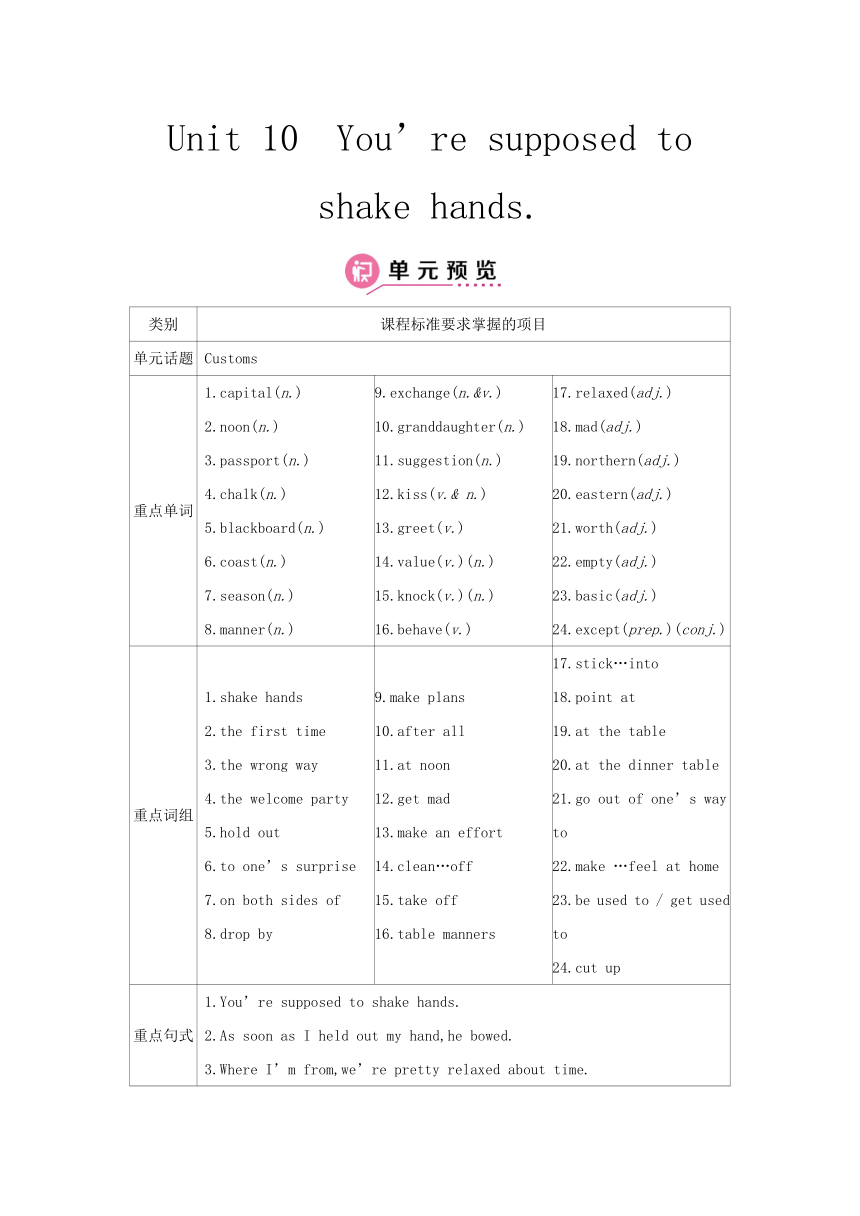 | |
| 格式 | docx | ||
| 文件大小 | 81.7KB | ||
| 资源类型 | 教案 | ||
| 版本资源 | 人教新目标(Go for it)版 | ||
| 科目 | 英语 | ||
| 更新时间 | 2021-09-11 14:09:31 | ||
图片预览

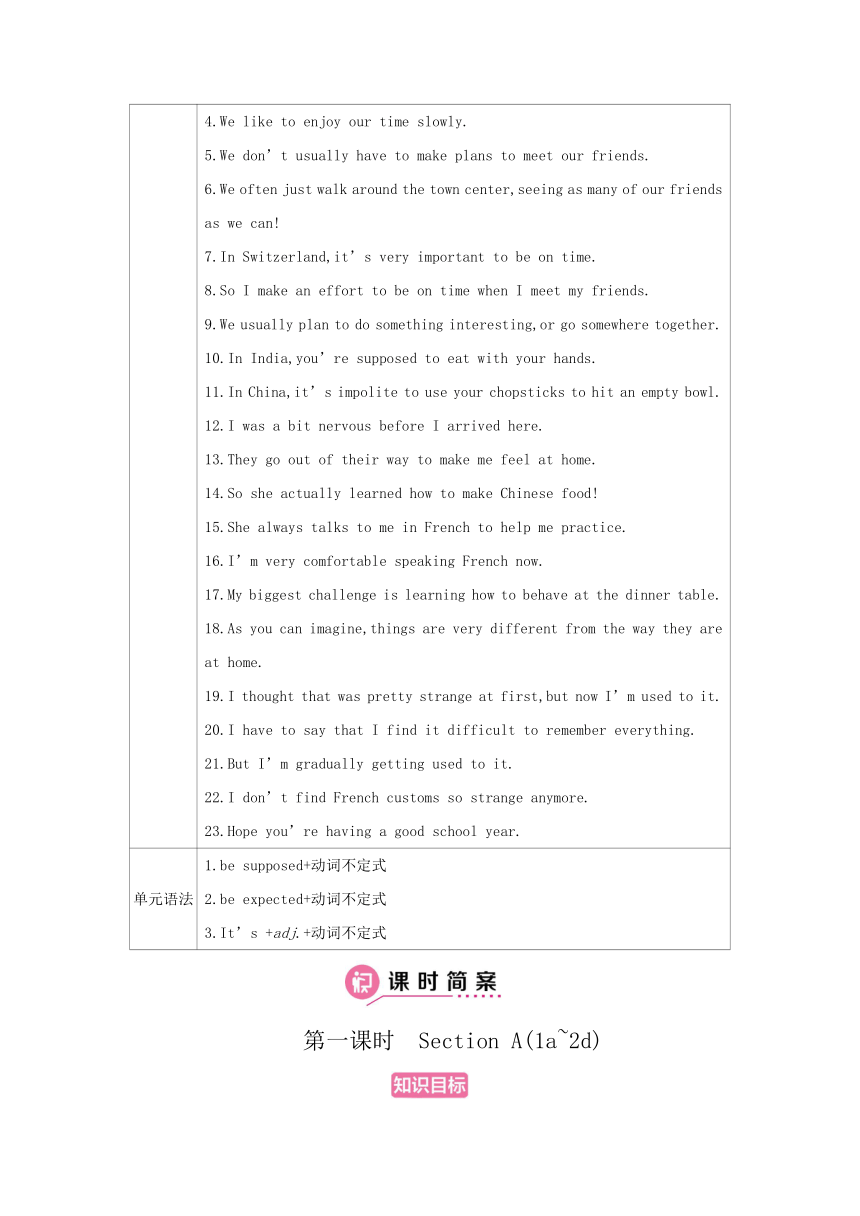
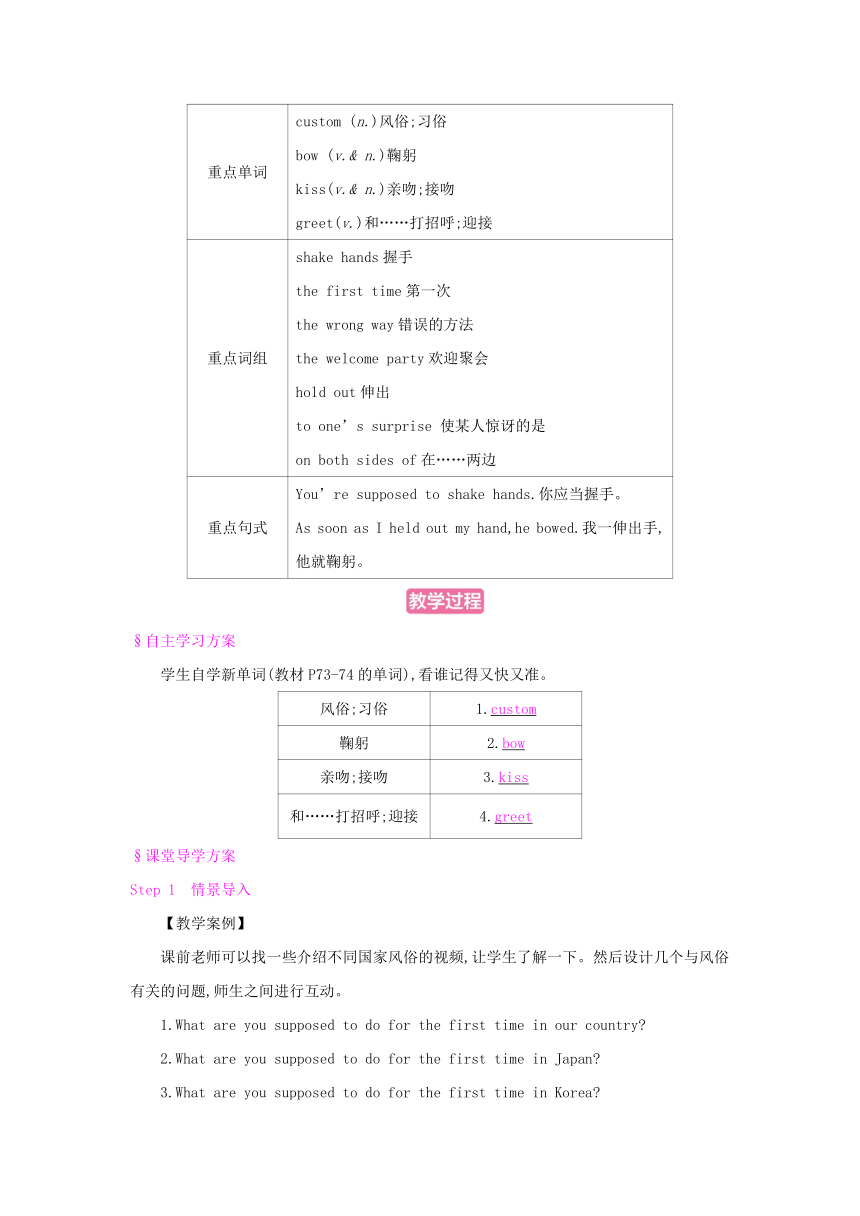
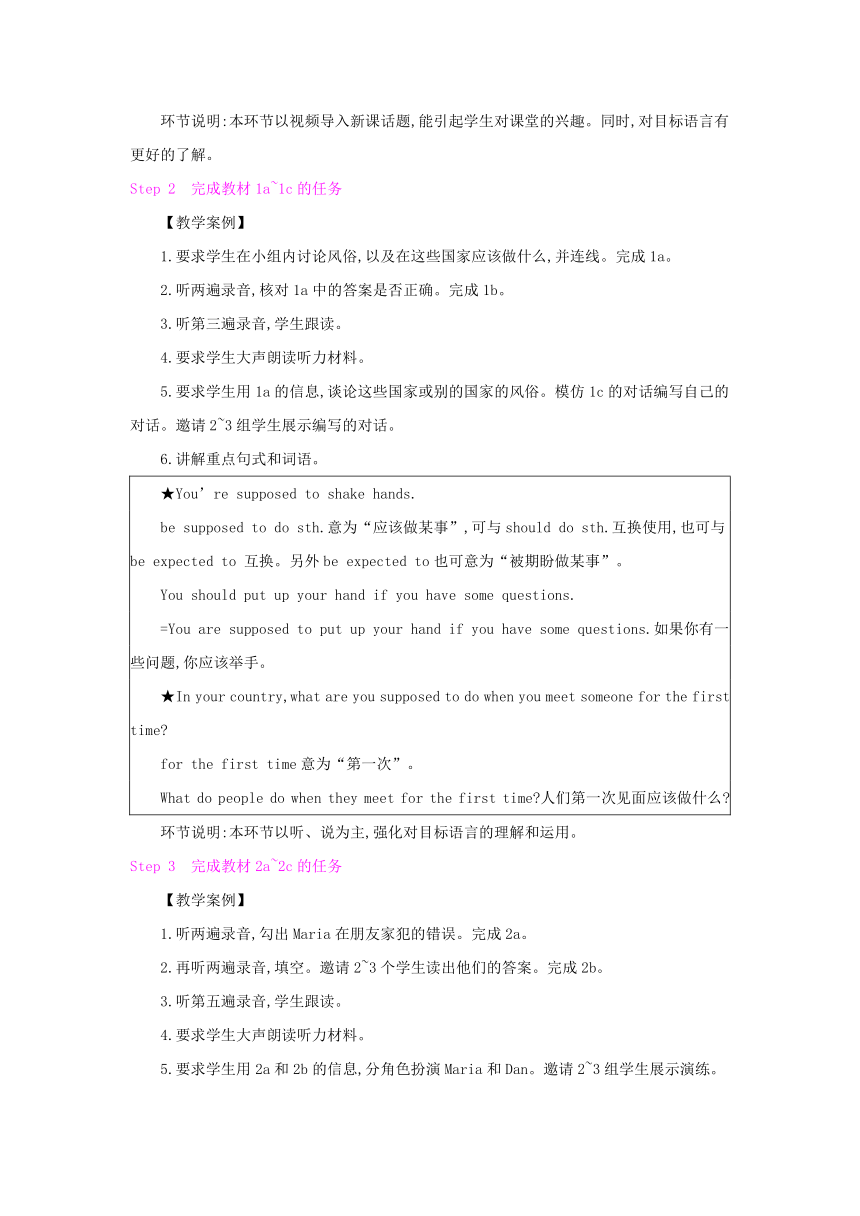
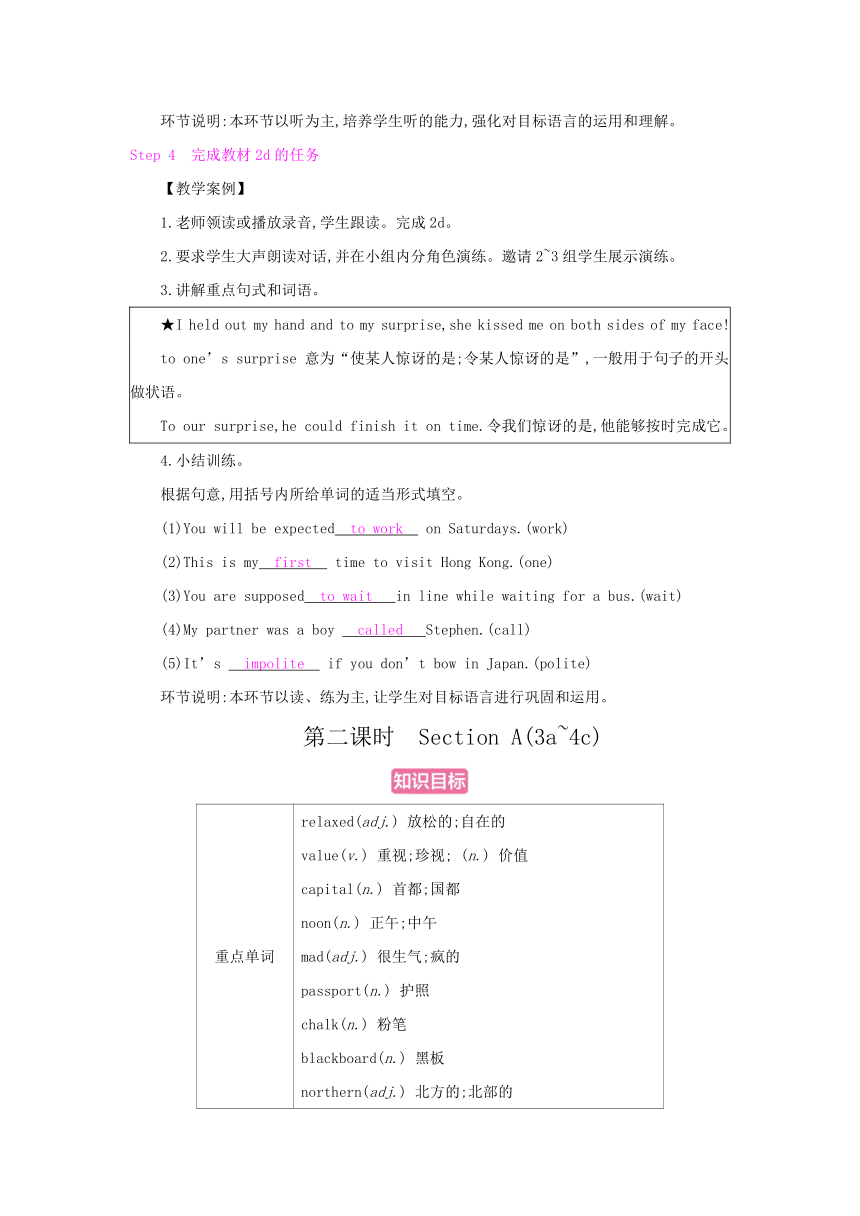
文档简介
Unit
10
You’re
supposed
to
shake
hands.
类别
课程标准要求掌握的项目
单元话题
Customs
重点单词
1.capital(n.)
2.noon(n.)
3.passport(n.)
4.chalk(n.)
5.blackboard(n.)
6.coast(n.)
7.season(n.)
8.manner(n.)
9.exchange(n.&v.)
10.granddaughter(n.)
11.suggestion(n.)
12.kiss(v.&
n.)
13.greet(v.)
14.value(v.)(n.)
15.knock(v.)(n.)
16.behave(v.)
17.relaxed(adj.)
18.mad(adj.)
19.northern(adj.)
20.eastern(adj.)
21.worth(adj.)
22.empty(adj.)
23.basic(adj.)
24.except(prep.)(conj.)
重点词组
1.shake
hands
2.the
first
time
3.the
wrong
way
4.the
welcome
party
5.hold
out
6.to
one’s
surprise
7.on
both
sides
of
8.drop
by
9.make
plans
10.after
all
11.at
noon
12.get
mad
13.make
an
effort
14.clean…off
15.take
off
16.table
manners
17.stick…into
18.point
at
19.at
the
table
20.at
the
dinner
table
21.go
out
of
one’s
way
to
22.make
…feel
at
home
23.be
used
to
/
get
used
to
24.cut
up
重点句式
1.You’re
supposed
to
shake
hands.
2.As
soon
as
I
held
out
my
hand,he
bowed.
3.Where
I’m
from,we’re
pretty
relaxed
about
time.
4.We
like
to
enjoy
our
time
slowly.
5.We
don’t
usually
have
to
make
plans
to
meet
our
friends.
6.We
often
just
walk
around
the
town
center,seeing
as
many
of
our
friends
as
we
can!
7.In
Switzerland,it’s
very
important
to
be
on
time.
8.So
I
make
an
effort
to
be
on
time
when
I
meet
my
friends.
9.We
usually
plan
to
do
something
interesting,or
go
somewhere
together.
10.In
India,you’re
supposed
to
eat
with
your
hands.
11.In
China,it’s
impolite
to
use
your
chopsticks
to
hit
an
empty
bowl.
12.I
was
a
bit
nervous
before
I
arrived
here.
13.They
go
out
of
their
way
to
make
me
feel
at
home.
14.So
she
actually
learned
how
to
make
Chinese
food!
15.She
always
talks
to
me
in
French
to
help
me
practice.
16.I’m
very
comfortable
speaking
French
now.
17.My
biggest
challenge
is
learning
how
to
behave
at
the
dinner
table.
18.As
you
can
imagine,things
are
very
different
from
the
way
they
are
at
home.
19.I
thought
that
was
pretty
strange
at
first,but
now
I’m
used
to
it.
20.I
have
to
say
that
I
find
it
difficult
to
remember
everything.
21.But
I’m
gradually
getting
used
to
it.
22.I
don’t
find
French
customs
so
strange
anymore.
23.Hope
you’re
having
a
good
school
year.
单元语法
1.be
supposed+动词不定式
2.be
expected+动词不定式
3.It’s
+adj.+动词不定式
第一课时 Section
A(1a~2d)
重点单词
custom
(n.)风俗;习俗
bow
(v.&
n.)鞠躬
kiss(v.&
n.)亲吻;接吻
greet(v.)和……打招呼;迎接
重点词组
shake
hands握手
the
first
time第一次
the
wrong
way错误的方法
the
welcome
party欢迎聚会
hold
out伸出
to
one’s
surprise
使某人惊讶的是
on
both
sides
of在……两边
重点句式
You’re
supposed
to
shake
hands.你应当握手。
As
soon
as
I
held
out
my
hand,he
bowed.我一伸出手,他就鞠躬。
§自主学习方案
学生自学新单词(教材P73-74的单词),看谁记得又快又准。
风俗;习俗
1.custom
鞠躬
2.bow
亲吻;接吻
3.kiss
和……打招呼;迎接
4.greet
§课堂导学方案
Step
1 情景导入
【教学案例】
课前老师可以找一些介绍不同国家风俗的视频,让学生了解一下。然后设计几个与风俗有关的问题,师生之间进行互动。
1.What
are
you
supposed
to
do
for
the
first
time
in
our
country?
2.What
are
you
supposed
to
do
for
the
first
time
in
Japan?
3.What
are
you
supposed
to
do
for
the
first
time
in
Korea?
环节说明:本环节以视频导入新课话题,能引起学生对课堂的兴趣。同时,对目标语言有更好的了解。
Step
2 完成教材1a~1c的任务
【教学案例】
1.要求学生在小组内讨论风俗,以及在这些国家应该做什么,并连线。完成1a。
2.听两遍录音,核对1a中的答案是否正确。完成1b。
3.听第三遍录音,学生跟读。
4.要求学生大声朗读听力材料。
5.要求学生用1a的信息,谈论这些国家或别的国家的风俗。模仿1c的对话编写自己的对话。邀请2~3组学生展示编写的对话。
6.讲解重点句式和词语。
★You’re
supposed
to
shake
hands.
be
supposed
to
do
sth.意为“应该做某事”,可与should
do
sth.互换使用,也可与be
expected
to
互换。另外be
expected
to也可意为“被期盼做某事”。
You
should
put
up
your
hand
if
you
have
some
questions.
=You
are
supposed
to
put
up
your
hand
if
you
have
some
questions.如果你有一些问题,你应该举手。
★In
your
country,what
are
you
supposed
to
do
when
you
meet
someone
for
the
first
time?
for
the
first
time意为“第一次”。
What
do
people
do
when
they
meet
for
the
first
time?人们第一次见面应该做什么?
环节说明:本环节以听、说为主,强化对目标语言的理解和运用。
Step
3 完成教材2a~2c的任务
【教学案例】
1.听两遍录音,勾出Maria在朋友家犯的错误。完成2a。
2.再听两遍录音,填空。邀请2~3个学生读出他们的答案。完成2b。
3.听第五遍录音,学生跟读。
4.要求学生大声朗读听力材料。
5.要求学生用2a和2b的信息,分角色扮演Maria和Dan。邀请2~3组学生展示演练。
环节说明:本环节以听为主,培养学生听的能力,强化对目标语言的运用和理解。
Step
4 完成教材2d的任务
【教学案例】
1.老师领读或播放录音,学生跟读。完成2d。
2.要求学生大声朗读对话,并在小组内分角色演练。邀请2~3组学生展示演练。
3.讲解重点句式和词语。
★I
held
out
my
hand
and
to
my
surprise,she
kissed
me
on
both
sides
of
my
face!
to
one’s
surprise
意为“使某人惊讶的是;令某人惊讶的是”,一般用于句子的开头做状语。
To
our
surprise,he
could
finish
it
on
time.令我们惊讶的是,他能够按时完成它。
4.小结训练。
根据句意,用括号内所给单词的适当形式填空。
(1)You
will
be
expected to
work
on
Saturdays.(work)?
(2)This
is
my first
time
to
visit
Hong
Kong.(one)
?
(3)You
are
supposed to
wait
in
line
while
waiting
for
a
bus.(wait)?
(4)My
partner
was
a
boy
called
Stephen.(call)
?
(5)It’s
impolite
if
you
don’t
bow
in
Japan.(polite)?
环节说明:本环节以读、练为主,让学生对目标语言进行巩固和运用。
第二课时 Section
A(3a~4c)
重点单词
relaxed(adj.)
放松的;自在的
value(v.)
重视;珍视;
(n.)
价值
capital(n.)
首都;国都
noon(n.)
正午;中午
mad(adj.)
很生气;疯的
passport(n.)
护照
chalk(n.)
粉笔
blackboard(n.)
黑板
northern(adj.)
北方的;北部的
coast(n.)
海岸;海滨
season(n.)
季;季节
knock(v.)
敲;击
(n.)
敲击声;敲击
eastern(adj.)
东方的;东部的
worth(adj.)
值得;
有……价值(的)
manner(n.)
方式;方法
(pl.)
礼貌;礼仪
重点词组
drop
by顺便访问;随便进入
make
plans制订计划
after
all毕竟;终归
at
noon在中午
get
mad大动肝火;气愤
make
an
effort作出努力
clean
…off把……擦掉
take
off脱下(衣服);(飞机等)起飞
table
manners餐桌礼仪
重点句式
Where
I’m
from,we’re
pretty
relaxed
about
time.我来的那个地方,我们对时间是相当放松的。
We
like
to
enjoy
our
time
slowly.我们喜欢慢慢地享受时间。
We
don’t
usually
have
to
make
plans
to
meet
our
friends.我们通常不必计划见朋友。
We
often
just
walk
around
the
town
center,seeing
as
many
of
our
friends
as
we
can!我们经常仅在镇中心散步,同时尽可能多地见朋友!
In
Switzerland,it’s
very
important
to
be
on
time.在瑞士,守时是很重要的。
So
I
make
an
effort
to
be
on
time
when
I
meet
my
friends.因此当我见朋友时我努力守时。
We
usually
plan
to
do
something
interesting,or
go
somewhere
together.我们通常计划做有趣的事,或者一起去某地。
§自主学习方案
学生自学新单词(教材P75-76的单词),看谁记得又快又准。
放松的;自在的
1.relaxed
重视;珍视;价值
2.value
首都;国都
3.capital
正午;中午
4.noon
很生气;疯的
5.mad
护照
6.passport
粉笔
7.chalk
黑板
8.blackboard
北方的;北部的
9.northern
海岸;海滨
10.coast
季;季节
11.season
敲;击;敲击声;敲击
12.knock
东方的;东部的
13.eastern
值得;
有……价值(的)
14.worth
方式;方法
(pl.)礼貌;礼仪
15.manner
§课堂导学方案
Step
1 情景导入
【教学案例】
本课时主要学习哥伦比亚和瑞士这两个国家在守时、有计划看望朋友及与朋友们一起制订计划方面的差异。上课时,老师可播放一段介绍这两个国家的风光的视频,为后面的阅读打下基础。
环节说明:本环节用播放视频的方式生动地展示这两个国家的文化,激发学生的学习兴趣。
Step
2 完成教材3a~3c的任务
【教学案例】
1.要求学生默读课文,回答3a的问题,看在哪个国家迟到15分钟是没事的。完成3a。
2.老师领读或播放录音,学生跟读。
3.要求学生大声朗读课文,邀请2~3个学生分段落朗读课文。
4.要求学生再次默读课文,完成3b的表格。要求2个学生读出他们的答案。
5.要求学生在小组内分角色扮演Teresa
和Marc进行对话演练。邀请2~3组学生展示演练。
环节说明:本环节以自学为主,在读的过程中训练学生对目标语言的理解和运用。
Step
3 完成教材Grammar
Focus~4c的任务
【教学案例】
1.要求学生大声朗读表格中的句子,并翻译成汉语。完成Grammar
Focus。
2.引导学生说出所包含的语法内容——动词不定式的用法。
3.用方框中的短语完成下列句子,完成4a。并要求学生将其翻译成汉语。
4.用括号中单词的正确形式填空,完成4b。邀请2个学生读出他们的答案。
5.在小组内讨论,若某个交换生来到我们国家,关于下面的6个方面给出你的建议。完成4c。邀请2~3组学生读出他们讨论的结果。
6.讲解重点句式和词语。
★Where
I’m
from,we’re
pretty
relaxed
about
time.
relaxed做形容词,意为“放松的;自在的”,be
relaxed
about
意为“对……随意”。
You
just
need
to
be
relaxed
about
this
examination.对于这次考试你只需要放松。
★We
value
the
time
we
spend
with
our
family
and
friends
in
our
everyday
lives.
value做动词,意为“重视;珍惜”。value还可做名词,意为“价值”。其形容词形式为valuable,意为“贵重的;重要的;有益的”。
Tony
is
my
best
friend
and
I
value
our
friendship
very
much.Tony是我最好的朋友,我很珍惜我们之间的友谊。
He
doesn’t
know
the
value
of
time.他不知道时间的价值。
Nothing
is
more
valuable
than
health.没有什么比健康更重要了。
★We
often
just
drop
by
our
friends’
homes
if
we
have
time.
drop
by是固定搭配,意为“顺便访问;顺便拜访”,后接地点名词。
I
often
drop
by
my
uncle’s
home
if
I
have
time.如果我有时间,我经常去拜访我叔叔。
7.小结训练。
根据汉语提示完成句子。
(1)Mike,don’t
be
angry
with
her, After
all
,she
is
your
youngest
sister.(毕竟)?
(2)When
I
visit
London,I
will
drop
by
some
of
my
old
friends.They
have
lived
there
for
a
long
time.(顺便拜访)?
(3)They
are
supposed
to
shake
hands
with
them.(握手)?
(4)Look
at
your
bedroom.It
is
a
bit
dirty.You
should
clean
it
up
right
now.(一点儿)?
(5)Before
I
began,I
also
had
to
clean
off
the
dust
from
the
tree
holes
first.(扫除,除去)?
环节说明:本环节以练为主,巩固对目标语言的运用和理解。
第三课时 Section
B(1a~1d)
重点单词
empty
(adj.)
空的;空洞的
重点词组
stick…into把……插进……里
point
at指向
at
the
table吃饭时
重点句式
In
India,you’re
supposed
to
eat
with
your
hands.在印度,你应当用手吃东西。
In
China,it’s
impolite
to
use
your
chopsticks
to
hit
an
empty
bowl.在中国,用筷子敲空碗是不礼貌的。
§自主学习方案
学生自学新单词(教材P77的单词),看谁记得又快又准。
空的;空洞的
empty
§课堂导学方案
Step
1 情景导入
【教学案例】
在不同的国家有不同的餐桌礼仪和饮食文化。你都了解哪些国家的呢?请同学们在小组内先讨论一些。回答下列问题。
1.Where
are
you
supposed
to
put
your
napkin?
2.When
are
you
supposed
to
leave
the
table?
3.Is
it
polite
to
make
noise
while
eating
food?
环节说明:本环节以讨论问题的方式入手,能自然地导入新课。
Step
2 完成教材1a~1c的任务
【教学案例】
1.要求学生朗读1a的句子,然后做出判断,在小组内讨论一下结果。邀请2个同学说出自己的判断结果。完成1a。
2.要求学生将1a中的句子译成汉语。邀请2个同学说出答案。
3.听两遍录音,给下列图片排序,完成1b。
4.听第三遍录音,学生跟读。
5.再听两遍录音,将下列句子连线,完成1c。
6.要求学生大声朗读听力材料。
环节说明:本环节以听为主,培养学生听的能力,使学生对目标语言有更好的理解。
Step
3 完成教材1d的任务
【教学案例】
1.要求学生在小组内讨论其他国家的餐桌礼仪。老师可以播放一些视频或图片来帮助同学们展开思路。完成1d。
2.2人一组演练关于这些国家的餐桌礼仪的对话,仿照1d的模式。邀请2~3组学生展示演练。
3.小结训练。
根据句意,用括号内所给单词的适当形式填空。
(1)It’s
impolite
to
speak loudly
to
the
old.(speak)
?
(2)The
children
should
start to
learn
English.(learn)?
(3)Tom
is
going
to
the
United
States
to
study
English.(study)?
(4)The
oldest
person
is expected
to
eat
first.(expect)
?
(5)They
are
talking
about
table manners in
their
country.(manner)
?
环节说明:本环节以说、练为主,巩固对目标语言的运用和理解。
第四课时 Section
B(2a~Self
Check)
重点单词
basic(adj.)
基本的;基础的
exchange(n.&
v.)
交换
granddaughter(n.)
(外)孙女
behave(v.)
表现;举止
except(prep.)
除了……之外
(conj.)
除了;只是
suggestion(n.)
建议
重点词组
at
the
dinner
table在餐桌上
go
out
of
one’s
way
to特地;格外努力
make
…feel
at
home使(某人)感到宾至如归
be
used
to
/
get
used
to习惯做某事
cut
up切碎
重点句式
I
was
a
bit
nervous
before
I
arrived
here.在我来这儿之前,我有点紧张。
They
go
out
of
their
way
to
make
me
feel
at
home.他们特地让我感到宾至如归。
So
she
actually
learned
how
to
make
Chinese
food!因此她实际上学习了怎样制作中国食物!
She
always
talks
to
me
in
French
to
help
me
practice.她总是用法语与我交谈帮助我练习。
I’m
very
comfortable
speaking
French
now.现在我很舒服地讲法语了。
My
biggest
challenge
is
learning
how
to
behave
at
the
dinner
table.我最大的挑战是学会怎样在饭桌上举止良好。
As
you
can
imagine,things
are
very
different
from
the
way
they
are
at
home.正如你能想象的,事情与在家里的方式很不同。
I
thought
that
was
pretty
strange
at
first,but
now
I’m
used
to
it.一开始我觉得那很奇怪,但是现在我习惯了。
I
have
to
say
that
I
find
it
difficult
to
remember
everything.我不得不说,我发现记住每件事是困难的。
重点句式
But
I’m
gradually
getting
used
to
it.但是我正逐渐地习惯它。
I
don’t
find
French
customs
so
strange
anymore.我不再觉得法国的风俗那么奇怪了。
Hope
you’re
having
a
good
school
year.希望你度过一个愉快的学年。
§自主学习方案
学生自学新单词(教材P78-80的单词),看谁记得又快又准。
基本的;基础的
1.basic
交换
2.exchange
(外)孙女
3.granddaughter
表现;举止
4.behave
除了……之外
除了;只是
5.except
建议
6.suggestion
§课堂导学方案
Step
1 情景导入
【教学案例】
老师可以给学生播放法国人就餐的视频或图片,让学生观察法国人就餐的习惯。法国是一个美食大国,也是一个讲究优雅的国度,法国用餐规矩很多。老师用2a中的问题与学生互动交流。
1.What
do
you
know
about
customs
in
foreign
countries?
2.What
do
you
think
is
the
biggest
challenge
when
visiting
a
foreign
country?
环节说明:本环节用视频或图片导入新课,激发同学们的探究兴趣。
Step
2 完成教材2a~2e的任务
【教学案例】
1.要求学生大声朗读2a的短文,并译成汉语。完成2a。
2.要求学生默读课文,回答4个问题。完成2b。
3.老师领读或播放录音,学生跟读。邀请2~3个学生分段落朗读课文。
4.朗读2c的四个句子,然后用方框中的词代替句中画线的词语。邀请2~3个学生给出答案。完成2c。
5.再次默读2b的短文,在文中找出法国的风俗,什么能做什么不能做,填写表格。完成2d。
6.要求学生在小组内讨论法国和中国餐桌礼仪的不同点和相同点,并列出来。完成2e。
7.讲解重点句式和词语。
★They
go
out
of
their
way
to
make
me
feel
at
home.
go
out
of
one’s
way
意为“特地做某事;想尽办法做某事”。
The
leaders
are
going
out
of
their
way
to
solve
the
problem.领导们想尽办法去解决这个问题。
★…,but
I’m
gradually
getting
used
to
it.
be/
get
used
to
(doing)
sth.意为“习惯于做某事”,其后常接名词、代词或动词-ing形式。used
to
do
sth.意为“过去常常做某事”,后接动词原形。
It
takes
time
to
get
used
to
living
abroad
alone.需要(一段)时间去习惯独自在国外生活。
Mr.Lee
is
used
to
washing
his
face
with
cold
water.李先生习惯用冷水洗脸。
环节说明:本环节以读、说为主,强化对目标语言的理解和运用。
Step
3 完成3a~Self
Check的任务
【教学案例】
1.假如你的笔友要来中国参与交流项目,他/她想了解中国的风俗,什么应该做什么不应该做。请你分三个方面完成下面的表格。完成3a。
2.用3a的信息,给你的笔友写一封信,告诉他/她在中国怎样正确地举止,给出你的建议。
3.讲解重点句式和词语。
★Let
me
give
you
some
suggestions
and
advice
about
Chinese
customs.
(1)suggestion为可数名词,意为“建议”,复数形式为suggestions,其动词形式是suggest。
His
suggestion
is
workable.他的建议是切实可行的。
(2)advice为不可数名词,意为“建议”,表示“一条建议”用a
piece
of
advice。“一些建议”用some
advice。advice的动词形式是advise。
I
have
some
free
advice
for
you.我有一些免费的建议给你。
4.用方框中的单词填空。完成1题。邀请1~2个学生读出他们的答案。
5.要求学生在小组内讨论我们国家的文化,并做出描述。完成2题。
6.小结训练。
根据汉语提示完成下列句子,每空一词。
(1)My
sister
always goes
out
of
her
way to
do
basic
exercise.(格外努力,基本的)?
(2)The
boy gets/is
used
to
playing
toys
with
others.(习惯于)?
(3)When
did
the
rude
boy
start
behave
well
at
the
table
?(在餐桌上)?
(4)Although/Though
she
was
a
bit
tired,she
still
cut
up
all
the
vegetables.(一点,切碎)?
(5)You
are
expected to
make
your
friends
feel
at
home .(使你的朋友们感到宾至如归)?
环节说明:本环节以写为主,强化对写的能力的培养,使学生对目标语言有更好的理解和运用。
10
You’re
supposed
to
shake
hands.
类别
课程标准要求掌握的项目
单元话题
Customs
重点单词
1.capital(n.)
2.noon(n.)
3.passport(n.)
4.chalk(n.)
5.blackboard(n.)
6.coast(n.)
7.season(n.)
8.manner(n.)
9.exchange(n.&v.)
10.granddaughter(n.)
11.suggestion(n.)
12.kiss(v.&
n.)
13.greet(v.)
14.value(v.)(n.)
15.knock(v.)(n.)
16.behave(v.)
17.relaxed(adj.)
18.mad(adj.)
19.northern(adj.)
20.eastern(adj.)
21.worth(adj.)
22.empty(adj.)
23.basic(adj.)
24.except(prep.)(conj.)
重点词组
1.shake
hands
2.the
first
time
3.the
wrong
way
4.the
welcome
party
5.hold
out
6.to
one’s
surprise
7.on
both
sides
of
8.drop
by
9.make
plans
10.after
all
11.at
noon
12.get
mad
13.make
an
effort
14.clean…off
15.take
off
16.table
manners
17.stick…into
18.point
at
19.at
the
table
20.at
the
dinner
table
21.go
out
of
one’s
way
to
22.make
…feel
at
home
23.be
used
to
/
get
used
to
24.cut
up
重点句式
1.You’re
supposed
to
shake
hands.
2.As
soon
as
I
held
out
my
hand,he
bowed.
3.Where
I’m
from,we’re
pretty
relaxed
about
time.
4.We
like
to
enjoy
our
time
slowly.
5.We
don’t
usually
have
to
make
plans
to
meet
our
friends.
6.We
often
just
walk
around
the
town
center,seeing
as
many
of
our
friends
as
we
can!
7.In
Switzerland,it’s
very
important
to
be
on
time.
8.So
I
make
an
effort
to
be
on
time
when
I
meet
my
friends.
9.We
usually
plan
to
do
something
interesting,or
go
somewhere
together.
10.In
India,you’re
supposed
to
eat
with
your
hands.
11.In
China,it’s
impolite
to
use
your
chopsticks
to
hit
an
empty
bowl.
12.I
was
a
bit
nervous
before
I
arrived
here.
13.They
go
out
of
their
way
to
make
me
feel
at
home.
14.So
she
actually
learned
how
to
make
Chinese
food!
15.She
always
talks
to
me
in
French
to
help
me
practice.
16.I’m
very
comfortable
speaking
French
now.
17.My
biggest
challenge
is
learning
how
to
behave
at
the
dinner
table.
18.As
you
can
imagine,things
are
very
different
from
the
way
they
are
at
home.
19.I
thought
that
was
pretty
strange
at
first,but
now
I’m
used
to
it.
20.I
have
to
say
that
I
find
it
difficult
to
remember
everything.
21.But
I’m
gradually
getting
used
to
it.
22.I
don’t
find
French
customs
so
strange
anymore.
23.Hope
you’re
having
a
good
school
year.
单元语法
1.be
supposed+动词不定式
2.be
expected+动词不定式
3.It’s
+adj.+动词不定式
第一课时 Section
A(1a~2d)
重点单词
custom
(n.)风俗;习俗
bow
(v.&
n.)鞠躬
kiss(v.&
n.)亲吻;接吻
greet(v.)和……打招呼;迎接
重点词组
shake
hands握手
the
first
time第一次
the
wrong
way错误的方法
the
welcome
party欢迎聚会
hold
out伸出
to
one’s
surprise
使某人惊讶的是
on
both
sides
of在……两边
重点句式
You’re
supposed
to
shake
hands.你应当握手。
As
soon
as
I
held
out
my
hand,he
bowed.我一伸出手,他就鞠躬。
§自主学习方案
学生自学新单词(教材P73-74的单词),看谁记得又快又准。
风俗;习俗
1.custom
鞠躬
2.bow
亲吻;接吻
3.kiss
和……打招呼;迎接
4.greet
§课堂导学方案
Step
1 情景导入
【教学案例】
课前老师可以找一些介绍不同国家风俗的视频,让学生了解一下。然后设计几个与风俗有关的问题,师生之间进行互动。
1.What
are
you
supposed
to
do
for
the
first
time
in
our
country?
2.What
are
you
supposed
to
do
for
the
first
time
in
Japan?
3.What
are
you
supposed
to
do
for
the
first
time
in
Korea?
环节说明:本环节以视频导入新课话题,能引起学生对课堂的兴趣。同时,对目标语言有更好的了解。
Step
2 完成教材1a~1c的任务
【教学案例】
1.要求学生在小组内讨论风俗,以及在这些国家应该做什么,并连线。完成1a。
2.听两遍录音,核对1a中的答案是否正确。完成1b。
3.听第三遍录音,学生跟读。
4.要求学生大声朗读听力材料。
5.要求学生用1a的信息,谈论这些国家或别的国家的风俗。模仿1c的对话编写自己的对话。邀请2~3组学生展示编写的对话。
6.讲解重点句式和词语。
★You’re
supposed
to
shake
hands.
be
supposed
to
do
sth.意为“应该做某事”,可与should
do
sth.互换使用,也可与be
expected
to
互换。另外be
expected
to也可意为“被期盼做某事”。
You
should
put
up
your
hand
if
you
have
some
questions.
=You
are
supposed
to
put
up
your
hand
if
you
have
some
questions.如果你有一些问题,你应该举手。
★In
your
country,what
are
you
supposed
to
do
when
you
meet
someone
for
the
first
time?
for
the
first
time意为“第一次”。
What
do
people
do
when
they
meet
for
the
first
time?人们第一次见面应该做什么?
环节说明:本环节以听、说为主,强化对目标语言的理解和运用。
Step
3 完成教材2a~2c的任务
【教学案例】
1.听两遍录音,勾出Maria在朋友家犯的错误。完成2a。
2.再听两遍录音,填空。邀请2~3个学生读出他们的答案。完成2b。
3.听第五遍录音,学生跟读。
4.要求学生大声朗读听力材料。
5.要求学生用2a和2b的信息,分角色扮演Maria和Dan。邀请2~3组学生展示演练。
环节说明:本环节以听为主,培养学生听的能力,强化对目标语言的运用和理解。
Step
4 完成教材2d的任务
【教学案例】
1.老师领读或播放录音,学生跟读。完成2d。
2.要求学生大声朗读对话,并在小组内分角色演练。邀请2~3组学生展示演练。
3.讲解重点句式和词语。
★I
held
out
my
hand
and
to
my
surprise,she
kissed
me
on
both
sides
of
my
face!
to
one’s
surprise
意为“使某人惊讶的是;令某人惊讶的是”,一般用于句子的开头做状语。
To
our
surprise,he
could
finish
it
on
time.令我们惊讶的是,他能够按时完成它。
4.小结训练。
根据句意,用括号内所给单词的适当形式填空。
(1)You
will
be
expected to
work
on
Saturdays.(work)?
(2)This
is
my first
time
to
visit
Hong
Kong.(one)
?
(3)You
are
supposed to
wait
in
line
while
waiting
for
a
bus.(wait)?
(4)My
partner
was
a
boy
called
Stephen.(call)
?
(5)It’s
impolite
if
you
don’t
bow
in
Japan.(polite)?
环节说明:本环节以读、练为主,让学生对目标语言进行巩固和运用。
第二课时 Section
A(3a~4c)
重点单词
relaxed(adj.)
放松的;自在的
value(v.)
重视;珍视;
(n.)
价值
capital(n.)
首都;国都
noon(n.)
正午;中午
mad(adj.)
很生气;疯的
passport(n.)
护照
chalk(n.)
粉笔
blackboard(n.)
黑板
northern(adj.)
北方的;北部的
coast(n.)
海岸;海滨
season(n.)
季;季节
knock(v.)
敲;击
(n.)
敲击声;敲击
eastern(adj.)
东方的;东部的
worth(adj.)
值得;
有……价值(的)
manner(n.)
方式;方法
(pl.)
礼貌;礼仪
重点词组
drop
by顺便访问;随便进入
make
plans制订计划
after
all毕竟;终归
at
noon在中午
get
mad大动肝火;气愤
make
an
effort作出努力
clean
…off把……擦掉
take
off脱下(衣服);(飞机等)起飞
table
manners餐桌礼仪
重点句式
Where
I’m
from,we’re
pretty
relaxed
about
time.我来的那个地方,我们对时间是相当放松的。
We
like
to
enjoy
our
time
slowly.我们喜欢慢慢地享受时间。
We
don’t
usually
have
to
make
plans
to
meet
our
friends.我们通常不必计划见朋友。
We
often
just
walk
around
the
town
center,seeing
as
many
of
our
friends
as
we
can!我们经常仅在镇中心散步,同时尽可能多地见朋友!
In
Switzerland,it’s
very
important
to
be
on
time.在瑞士,守时是很重要的。
So
I
make
an
effort
to
be
on
time
when
I
meet
my
friends.因此当我见朋友时我努力守时。
We
usually
plan
to
do
something
interesting,or
go
somewhere
together.我们通常计划做有趣的事,或者一起去某地。
§自主学习方案
学生自学新单词(教材P75-76的单词),看谁记得又快又准。
放松的;自在的
1.relaxed
重视;珍视;价值
2.value
首都;国都
3.capital
正午;中午
4.noon
很生气;疯的
5.mad
护照
6.passport
粉笔
7.chalk
黑板
8.blackboard
北方的;北部的
9.northern
海岸;海滨
10.coast
季;季节
11.season
敲;击;敲击声;敲击
12.knock
东方的;东部的
13.eastern
值得;
有……价值(的)
14.worth
方式;方法
(pl.)礼貌;礼仪
15.manner
§课堂导学方案
Step
1 情景导入
【教学案例】
本课时主要学习哥伦比亚和瑞士这两个国家在守时、有计划看望朋友及与朋友们一起制订计划方面的差异。上课时,老师可播放一段介绍这两个国家的风光的视频,为后面的阅读打下基础。
环节说明:本环节用播放视频的方式生动地展示这两个国家的文化,激发学生的学习兴趣。
Step
2 完成教材3a~3c的任务
【教学案例】
1.要求学生默读课文,回答3a的问题,看在哪个国家迟到15分钟是没事的。完成3a。
2.老师领读或播放录音,学生跟读。
3.要求学生大声朗读课文,邀请2~3个学生分段落朗读课文。
4.要求学生再次默读课文,完成3b的表格。要求2个学生读出他们的答案。
5.要求学生在小组内分角色扮演Teresa
和Marc进行对话演练。邀请2~3组学生展示演练。
环节说明:本环节以自学为主,在读的过程中训练学生对目标语言的理解和运用。
Step
3 完成教材Grammar
Focus~4c的任务
【教学案例】
1.要求学生大声朗读表格中的句子,并翻译成汉语。完成Grammar
Focus。
2.引导学生说出所包含的语法内容——动词不定式的用法。
3.用方框中的短语完成下列句子,完成4a。并要求学生将其翻译成汉语。
4.用括号中单词的正确形式填空,完成4b。邀请2个学生读出他们的答案。
5.在小组内讨论,若某个交换生来到我们国家,关于下面的6个方面给出你的建议。完成4c。邀请2~3组学生读出他们讨论的结果。
6.讲解重点句式和词语。
★Where
I’m
from,we’re
pretty
relaxed
about
time.
relaxed做形容词,意为“放松的;自在的”,be
relaxed
about
意为“对……随意”。
You
just
need
to
be
relaxed
about
this
examination.对于这次考试你只需要放松。
★We
value
the
time
we
spend
with
our
family
and
friends
in
our
everyday
lives.
value做动词,意为“重视;珍惜”。value还可做名词,意为“价值”。其形容词形式为valuable,意为“贵重的;重要的;有益的”。
Tony
is
my
best
friend
and
I
value
our
friendship
very
much.Tony是我最好的朋友,我很珍惜我们之间的友谊。
He
doesn’t
know
the
value
of
time.他不知道时间的价值。
Nothing
is
more
valuable
than
health.没有什么比健康更重要了。
★We
often
just
drop
by
our
friends’
homes
if
we
have
time.
drop
by是固定搭配,意为“顺便访问;顺便拜访”,后接地点名词。
I
often
drop
by
my
uncle’s
home
if
I
have
time.如果我有时间,我经常去拜访我叔叔。
7.小结训练。
根据汉语提示完成句子。
(1)Mike,don’t
be
angry
with
her, After
all
,she
is
your
youngest
sister.(毕竟)?
(2)When
I
visit
London,I
will
drop
by
some
of
my
old
friends.They
have
lived
there
for
a
long
time.(顺便拜访)?
(3)They
are
supposed
to
shake
hands
with
them.(握手)?
(4)Look
at
your
bedroom.It
is
a
bit
dirty.You
should
clean
it
up
right
now.(一点儿)?
(5)Before
I
began,I
also
had
to
clean
off
the
dust
from
the
tree
holes
first.(扫除,除去)?
环节说明:本环节以练为主,巩固对目标语言的运用和理解。
第三课时 Section
B(1a~1d)
重点单词
empty
(adj.)
空的;空洞的
重点词组
stick…into把……插进……里
point
at指向
at
the
table吃饭时
重点句式
In
India,you’re
supposed
to
eat
with
your
hands.在印度,你应当用手吃东西。
In
China,it’s
impolite
to
use
your
chopsticks
to
hit
an
empty
bowl.在中国,用筷子敲空碗是不礼貌的。
§自主学习方案
学生自学新单词(教材P77的单词),看谁记得又快又准。
空的;空洞的
empty
§课堂导学方案
Step
1 情景导入
【教学案例】
在不同的国家有不同的餐桌礼仪和饮食文化。你都了解哪些国家的呢?请同学们在小组内先讨论一些。回答下列问题。
1.Where
are
you
supposed
to
put
your
napkin?
2.When
are
you
supposed
to
leave
the
table?
3.Is
it
polite
to
make
noise
while
eating
food?
环节说明:本环节以讨论问题的方式入手,能自然地导入新课。
Step
2 完成教材1a~1c的任务
【教学案例】
1.要求学生朗读1a的句子,然后做出判断,在小组内讨论一下结果。邀请2个同学说出自己的判断结果。完成1a。
2.要求学生将1a中的句子译成汉语。邀请2个同学说出答案。
3.听两遍录音,给下列图片排序,完成1b。
4.听第三遍录音,学生跟读。
5.再听两遍录音,将下列句子连线,完成1c。
6.要求学生大声朗读听力材料。
环节说明:本环节以听为主,培养学生听的能力,使学生对目标语言有更好的理解。
Step
3 完成教材1d的任务
【教学案例】
1.要求学生在小组内讨论其他国家的餐桌礼仪。老师可以播放一些视频或图片来帮助同学们展开思路。完成1d。
2.2人一组演练关于这些国家的餐桌礼仪的对话,仿照1d的模式。邀请2~3组学生展示演练。
3.小结训练。
根据句意,用括号内所给单词的适当形式填空。
(1)It’s
impolite
to
speak loudly
to
the
old.(speak)
?
(2)The
children
should
start to
learn
English.(learn)?
(3)Tom
is
going
to
the
United
States
to
study
English.(study)?
(4)The
oldest
person
is expected
to
eat
first.(expect)
?
(5)They
are
talking
about
table manners in
their
country.(manner)
?
环节说明:本环节以说、练为主,巩固对目标语言的运用和理解。
第四课时 Section
B(2a~Self
Check)
重点单词
basic(adj.)
基本的;基础的
exchange(n.&
v.)
交换
granddaughter(n.)
(外)孙女
behave(v.)
表现;举止
except(prep.)
除了……之外
(conj.)
除了;只是
suggestion(n.)
建议
重点词组
at
the
dinner
table在餐桌上
go
out
of
one’s
way
to特地;格外努力
make
…feel
at
home使(某人)感到宾至如归
be
used
to
/
get
used
to习惯做某事
cut
up切碎
重点句式
I
was
a
bit
nervous
before
I
arrived
here.在我来这儿之前,我有点紧张。
They
go
out
of
their
way
to
make
me
feel
at
home.他们特地让我感到宾至如归。
So
she
actually
learned
how
to
make
Chinese
food!因此她实际上学习了怎样制作中国食物!
She
always
talks
to
me
in
French
to
help
me
practice.她总是用法语与我交谈帮助我练习。
I’m
very
comfortable
speaking
French
now.现在我很舒服地讲法语了。
My
biggest
challenge
is
learning
how
to
behave
at
the
dinner
table.我最大的挑战是学会怎样在饭桌上举止良好。
As
you
can
imagine,things
are
very
different
from
the
way
they
are
at
home.正如你能想象的,事情与在家里的方式很不同。
I
thought
that
was
pretty
strange
at
first,but
now
I’m
used
to
it.一开始我觉得那很奇怪,但是现在我习惯了。
I
have
to
say
that
I
find
it
difficult
to
remember
everything.我不得不说,我发现记住每件事是困难的。
重点句式
But
I’m
gradually
getting
used
to
it.但是我正逐渐地习惯它。
I
don’t
find
French
customs
so
strange
anymore.我不再觉得法国的风俗那么奇怪了。
Hope
you’re
having
a
good
school
year.希望你度过一个愉快的学年。
§自主学习方案
学生自学新单词(教材P78-80的单词),看谁记得又快又准。
基本的;基础的
1.basic
交换
2.exchange
(外)孙女
3.granddaughter
表现;举止
4.behave
除了……之外
除了;只是
5.except
建议
6.suggestion
§课堂导学方案
Step
1 情景导入
【教学案例】
老师可以给学生播放法国人就餐的视频或图片,让学生观察法国人就餐的习惯。法国是一个美食大国,也是一个讲究优雅的国度,法国用餐规矩很多。老师用2a中的问题与学生互动交流。
1.What
do
you
know
about
customs
in
foreign
countries?
2.What
do
you
think
is
the
biggest
challenge
when
visiting
a
foreign
country?
环节说明:本环节用视频或图片导入新课,激发同学们的探究兴趣。
Step
2 完成教材2a~2e的任务
【教学案例】
1.要求学生大声朗读2a的短文,并译成汉语。完成2a。
2.要求学生默读课文,回答4个问题。完成2b。
3.老师领读或播放录音,学生跟读。邀请2~3个学生分段落朗读课文。
4.朗读2c的四个句子,然后用方框中的词代替句中画线的词语。邀请2~3个学生给出答案。完成2c。
5.再次默读2b的短文,在文中找出法国的风俗,什么能做什么不能做,填写表格。完成2d。
6.要求学生在小组内讨论法国和中国餐桌礼仪的不同点和相同点,并列出来。完成2e。
7.讲解重点句式和词语。
★They
go
out
of
their
way
to
make
me
feel
at
home.
go
out
of
one’s
way
意为“特地做某事;想尽办法做某事”。
The
leaders
are
going
out
of
their
way
to
solve
the
problem.领导们想尽办法去解决这个问题。
★…,but
I’m
gradually
getting
used
to
it.
be/
get
used
to
(doing)
sth.意为“习惯于做某事”,其后常接名词、代词或动词-ing形式。used
to
do
sth.意为“过去常常做某事”,后接动词原形。
It
takes
time
to
get
used
to
living
abroad
alone.需要(一段)时间去习惯独自在国外生活。
Mr.Lee
is
used
to
washing
his
face
with
cold
water.李先生习惯用冷水洗脸。
环节说明:本环节以读、说为主,强化对目标语言的理解和运用。
Step
3 完成3a~Self
Check的任务
【教学案例】
1.假如你的笔友要来中国参与交流项目,他/她想了解中国的风俗,什么应该做什么不应该做。请你分三个方面完成下面的表格。完成3a。
2.用3a的信息,给你的笔友写一封信,告诉他/她在中国怎样正确地举止,给出你的建议。
3.讲解重点句式和词语。
★Let
me
give
you
some
suggestions
and
advice
about
Chinese
customs.
(1)suggestion为可数名词,意为“建议”,复数形式为suggestions,其动词形式是suggest。
His
suggestion
is
workable.他的建议是切实可行的。
(2)advice为不可数名词,意为“建议”,表示“一条建议”用a
piece
of
advice。“一些建议”用some
advice。advice的动词形式是advise。
I
have
some
free
advice
for
you.我有一些免费的建议给你。
4.用方框中的单词填空。完成1题。邀请1~2个学生读出他们的答案。
5.要求学生在小组内讨论我们国家的文化,并做出描述。完成2题。
6.小结训练。
根据汉语提示完成下列句子,每空一词。
(1)My
sister
always goes
out
of
her
way to
do
basic
exercise.(格外努力,基本的)?
(2)The
boy gets/is
used
to
playing
toys
with
others.(习惯于)?
(3)When
did
the
rude
boy
start
behave
well
at
the
table
?(在餐桌上)?
(4)Although/Though
she
was
a
bit
tired,she
still
cut
up
all
the
vegetables.(一点,切碎)?
(5)You
are
expected to
make
your
friends
feel
at
home .(使你的朋友们感到宾至如归)?
环节说明:本环节以写为主,强化对写的能力的培养,使学生对目标语言有更好的理解和运用。
同课章节目录
- Unit 1 How can we become good learners.
- Section A
- Section B
- Unit 2 I think that mooncakes are delicious!
- Section A
- Section B
- Unit 3 Could you please tell me where the restroom
- Section A
- Section B
- Unit 4 I used to be afraid of the dark.
- Section A
- Section B
- Unit 5 What are the shirts made of?
- Section A
- Section B
- Review of Units 1-5
- Unit 6 When was it invented?
- Section A
- Section B
- Unit 7 Teenagers should be allowed to choose their
- Section A
- Section B
- Unit 8 It must belong to Carla.
- Section A
- Section B
- Unit 9 I like music that I can dance to.
- Section A
- Section B
- Unit 10 You're supposed to shake hands.
- Section A
- Section B
- Review of Units 6-10
- Unit 11 Sad movies make me cry.
- Section A
- Section B
- Unit 12 Life is full of the unexpected
- Section A
- Section B
- Unit 13 We're trying to save the earth!
- Section A
- Section B
- Unit 14 I remember meeting all of you in Grade 7.
- Section A
- Section B
- Review of Units 11-14
